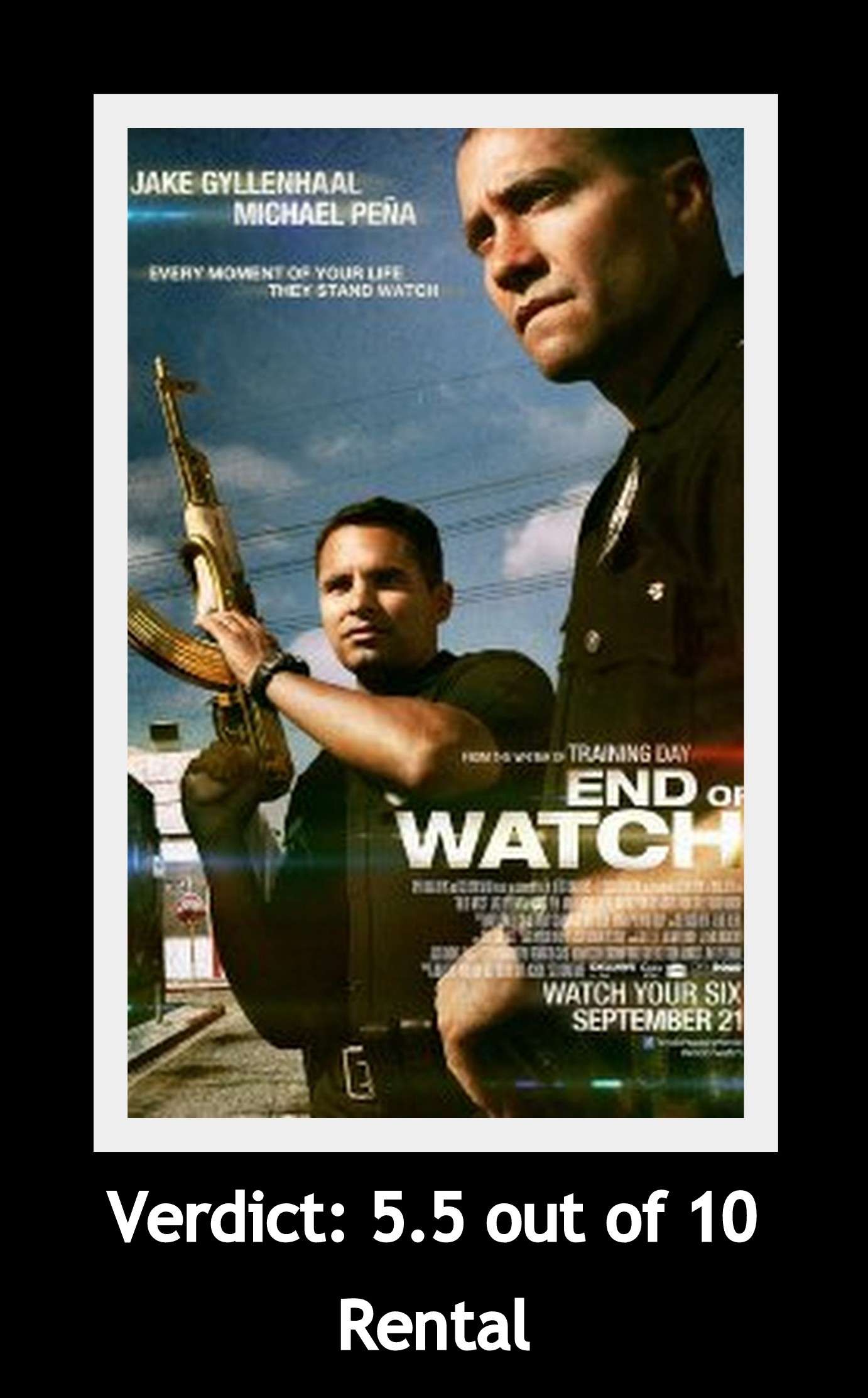 by Jason Pyles
by Jason Pyles
Movie Podcast Weekly.com
Premise: While going about their daily duties, two LAPD officers keep stumbling onto a ferocious drug cartel with zero tolerance for ambitious cops.
Review: “End of Watch” may be the first found footage, shaky-cam, docu-drama, pseudo-documentary cop movie that also doubles as a feature-length PR commercial for the Los Angeles Police Department. (Seriously, this whole movie could be an advertisement for the LAPD. Perhaps it is.)
Actually, “End of Watch” is quite a number of things: It’s also a love story between two men played by Jake Gyllenhaal and Michael Peña, not too far off from Gyllenhaal’s most famous role in “Brokeback Mountain” (2005). Don’t misunderstand me, “End of Watch” is not a romance about two homosexual policemen, it’s about two men who depend on each other in daily, life-or-death situations, partners who have moved from being friends to being brothers.
“End of Watch” was written and directed by David Ayer, whose work I generally admire. He wrote “U-571” (2000), “The Fast and the Furious” (2001), “Training Day” (2001), “Dark Blue” (2002), “S.W.A.T.” (2003), and “Harsh Times” (2005), the last of which he also directed, along with “Street Kings” (2008). Having spent a lot of time during his teenage years as a witness to the streets of South Central Los Angeles (according to his IMDb trivia page), it’s not surprising that Ayer has such an ability for gritty, criminal portrayals. Apparently, his life experience informs Ayer’s work, giving it veracity.
But as with action movies and any other type of genre film, conventions that are not deployed in the service of the story are merely that, just conventions, nothing more. I suspect that in an attempt to enhance the documentary feel of his film, Ayer has structured his screenplay more like that of a “Cops” television episode than a conventional three-part story arc. So, we’re given the cops at the station, being given instructions and scolding by their captain. Then we have cops in their cruiser, involved in vulgar but humorous back-and-forth banter with a little philosophizing about life. That dialogue is interrupted by a call, and then we get some suspenseful action. This pattern is repeated throughout the film, with an occasional reprieve for events the officers’ personal lives. Because of this sequence of repetition, “End of Watch” feels a little monotonous and even routine, which is probably similar to what if feels like to be a police officer.
The hand-held camera is awfully shaky in the beginning of the film, so be warned, all those who are affected by motion sickness. The shaky cam improves as the film progresses. Oddly, and to the film’s detriment, the filming is not just limited to the police officers. Various other characters are carrying a camera, too, such as some gangsters who are filming their drive-by shooting. (I thought it would be Rule No. 1 of the criminal underworld not to have any damning evidence of their crimes.) And about three-fourths through the movie, the film-within-a-film subplot is basically dropped and forgotten about altogether. Now, I suppose on some level, this is worthy of praise: We film critics have spent a lot of time criticizing hand-held films, like “Cloverfield,” for instance, claiming that once “things get real,” the would-be filmmaker would forget all about his camera and run for his life. But in “End of Watch,” it feels like the cameras became too unwieldy at a script level.
I will not reveal any spoilers in this paragraph, so I will comment on the film’s ending obliquely. After opting for a particular ending, it is as if Ayer did not want to commit to that decision after all, and he closes out the film on a different note, ineffectively having his cake and eating it, too, so to speak. This has been done in other films (and it has been done effectively), but Ayer is not successful in this instance.
Summary: Despite some inconsistent filmmaking techniques and a loosely assembled, episodic plot, “End of Watch” is engaging, at times shocking, and certainly entertaining, especially for anyone with an affinity for cop movies. For instance, for visceral and exploitative depictions of day-in-the-life, crime-fighting violence, “End of Watch” delivers in a way that “We Own the Night” (2007) never does. Nevertheless, while writer-director David Ayer obviously shows love for the boys in blue, he doesn’t show nearly enough love to his storytelling at the technical and script level, which ultimately maims the film.
Verdict: 5.5 out of 10 ( Rental )
Directed by David Ayer
Starring Jake Gyllenhaal, Michael Peña, Anna Kendrick
Genre: Crime Drama / Thriller
Country: USA
MPAA Rating: R (for strong violence, some disturbing images, pervasive language, including sexual references, and some drug use)
Runtime: 109 minutes.
Trailer: Watch
DVD: N/A
Blu-ray: N/A
U.S. Release Date: September 21, 2012
0003.

This is an excellent review of the film. I think I liked the usage of “found footage” less than you, yet liked the film overall more than you. You nailed the ending.